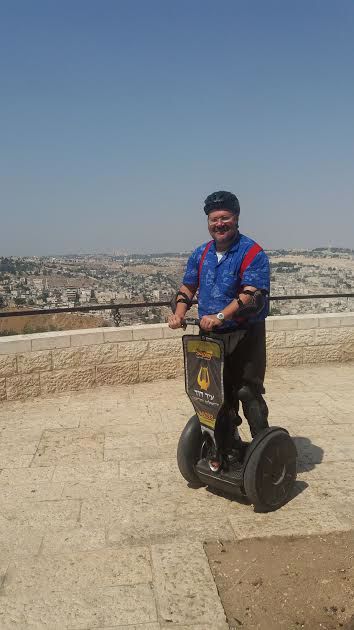| WE HAVE 7 MAJOR NEEDS: 1. SECURITY AND AFFECTION 2. EXCITEMENT/VARIETY/STIMULATION AND NEWNESS 3. SIGNIFICANCE/RESPECT/ATTENTION & VALIDATION 4. LOVE 5. AUTONOMY/INDEPENDENCE/SELF-DETERMINATION 6. GROWTH/SELF-ACTUALIZATION/CREATIVITY 7. MEANINGFULNESS/CONTRIBUTION TO A HIGH CAUSE No matter the reason, if one of these needs isn't being met, we must seek the means to fill this void. Love Yehuda Lave |
|
|
| Next week is "apartheid week" on campuses and other forums around the world. Even though we all know it is ludicrous and cynically sick propaganda, similar to placing Libya as the chairperson on the United Nations Human Rights Council ! There are millions of unsuspecting citizens of the world who consume this garbage because they hear no other message or are unfortunately illiterate or delinquent. Please do your bit in distributing this short photo essay.. It says it all. There are many Arab students in all Israeli universities, and Arab doctors and nurses in all Israeli hospitals, studying and working. Apartheid ?
| FORWARD TO THE WHOLE WORLD | | | |
|
|
| |  Chaya V Chaya V  Monday, 31 December 2:15 PM Monday, 31 December 2:15 PM | | Ahhh, the New Year — a time for contemplation, soul-searching and a short-lived determination to make things different this year. We thought we'd take a quick look at the top 10 things Israelis should consider putting on their New Year's resolutions list. 1. Learn how to stand in line  Can Israelis learn how to queue up properly? Photo by Avi Dishi/FLASH90 Finding your Israel-bound flight at the airport is a pretty simple thing to do. Just look for the mass of people refusing to form an orderly line. It's still unknown whether Israelis are actually physically incapable of standing in line, but it sure feels so. And since Israelis are absolutely awed by the way people form lines abroad, perhaps that's motivation enough to start working on it. 2. Stop smoking Recognize the smell of smoke wafting through the streets of Israel? That's because 22 percent of Israelis over the age of 20 smoke at least one cigarette a day. Now would really be the time to quit – not only is the habit horribly unhealthy, it's expensive, bad for the environment and really bothers everyone else. 3. Keep on eating copious quantities of greens  Illustrative photo by Viktor Kochetkov via Shutterstock.com Forget the Land of Milk and Honey. Israel is more like the Land of Salad. No Israeli meal is considered complete without some vegetables – breakfast included – and plain sliced watermelon makes for a perfectly acceptable dessert. Now here's a habit definitely worth keeping. 4. Cut down on the burekas. And the malawach. And the pita bread.  Burekas are best enjoyed in moderation. Photo by John Theodor via Shutterstock.com While Israelis do eat a lot of salad, they also have a (very) soft spot for simple carbs. Every single one of Israel's ethnic communities boasts a traditional specialty dough – be it bread, blintzes or pie. And while there's nothing wrong with the odd treat, it's high time to take those laden bureka trays off the table. 5. Stop driving like crazy Israeli roads can be a truly terrifying experience. The speed limit is completely ignored, drivers cut you from all directions and everyone is on their phones – and the results are deadly. Over 200 people were killed and almost 1,500 people were badly injured in car accidents from January to September 2018 alone. Let's try and make 2019 a safer year for all. 6. Don't stop doing family dinners  An Israeli family enjoys dinner together. Photo by Nati Shohat/Flash90 Israelis are really into their families. While elsewhere in the world people often see their relatives once or twice a year, Israeli families like to get together as often as possible. Be it Friday night dinner, birthdays or holiday celebrations, there's always a reason to catch up with loved ones. And we wouldn't have it any other way. 7. Discover the world  Ancient temple ruins at Gadi Sagar Lake in northern India. Photo by Roop Dey via Shutterstock.com Go anywhere in the world, and you'll probably bump into an Israeli or two. Perhaps stemming from the tradition of lengthy post-army trips, Israelis are really keen travelers. If only they'd stop being so disappointed to find fellow countrymen wherever they go. 8. Let people practice their Hebrew This one's familiar to all those who've tried making conversation in Ivrit while staying in Israel. You gather your courage, rummage your brains and tentatively ask a question in halting, accented Hebrew, only to be answered in a rapid stream of English. Far from being rude about your language skills, the person you're talking to just wants to put you at ease. But don't be deterred. If you feel up to it, carry on in Hebrew – Israelis are secretly chuffed that you're making the effort. 9. Keep your voice down  Yes, it's impossible not to listen in. A girl talks on her cell phone on a bus in Jerusalem. Photo by Anna Kaplan/Flash90 Ever taken public transport in Israel? Then you've probably been privy to the intimate details of your fellow passengers' lives. Medical diagnoses, love lives and politics are all discussed in high-volume in Israel. And while the person loudly describing their piles on the phone might not mind sharing that information, we'd really rather not know. 10. Be kind  Photo by Shutterstock. Israelis often come across as brash and short-tempered. But they are actually some of the kindest people in the world. Just take a look at all the people carrying elderly strangers' shopping, holding others' babies for them in line or insisting that you come over for dinner after knowing you a full minute. Let's carry on this spirit of kindness to make 2019 the best year yet. | |
|
|
"I will sing to HaShem, for very exalted is He!" (Exodus 15:1) Shvat 12, 5779 So many earth shattering (sea splitting) and dramatic events occur in rapid succession in the Torah reading, Beshalach, that it is easy to get lost in the drama and lose track of the underlying story which is propelling the narrative forward. The mad midnight dash from Egypt, Pharaoh's sudden change of heart, the hot pursuit of the Egyptian army, the all-night vigil at the edge of the Sea of Reeds... all this brought terror to the hearts of the escaping Israelites, who, after all, unlike we the readers, aren't privy to G-d's reasons for suddenly changing their route in mid-flight, or His deliberate setting of a trap for Pharaoh and Egypt's final cataclysmic denouement in the sea. Israel was terrified, and for good reason. For four hundred and thirty years Israel dwelled in Egypt, during which time a slow but pervasive disconnect evolved between the children of Israel and the G-d of their fathers. This was made abundantly evident earlier in the book of Exodus when we read that "G-d heard their cry, and G-d remembered His covenant with Avraham, with Yitzchak, and with Yaakov. And G-d saw the children of Israel, and G-d knew." (Exodus 2:24-25) G-d's 'need,' as it were, to "remember His covenant" clearly intimates that a great distance had grown between G-d and His people. His immanent Presence was not with them day and night. They were still the proud children of Israel, and they still believed in the G-d of Avraham, Yitzchak, and Yaakov, but that was precisely the point: The G-d of the enslaved Israelites in Egypt was the G-d of their ancestors, a distant G-d remembered for His benevolence concerning their fathers, but only a faint presence in their enduring suffering as slaves, property of Pharaoh. So, when all of a sudden, Pharaoah's invasive and oppressive presence and control of every facet of their lives is gone, and G-d has dramatically and profoundly retaken the reins of their lives, the children of Israel are in an emotional and spiritual turmoil. Keep this in mind as we read of their terror when trapped between Pharaoh's army and the impassible Sea of Reeds; when they arrived at Marah, parched, with no water to drink, and bitterly complained; when they arrived at the desert of Sin, and acerbically cried out "If only we had died by the hand of HaShem in the land of Egypt," (ibid 16:3) and when a few individuals took more than their share of manna, and a tiny minority even violated the Shabbat by searching for manna; when they quarreled with Moshe at Rephidim, once again parched and desperate for water; and, finally, their "testing HaShem, saying, Is HaShem in our midst or not?" (ibid 17:7) their very uncertainty precipitating the sudden and unprovoked ambush by Amalek on the newborn nation. Moshe reveals his own humanity in his expressions of impatience with his complaining people, but he, after all, experiences an intimacy with G-d that the children of Israel have still not achieved, nor do they yet realize is their birthright and their destiny. G-d understands, and patiently nurtures and cares for His people. On the other hand, this infant nation, fearlessly or fearfully, followed G-d into an unknown land, a vast and empty wasteland, as affectionately recalled by the prophet Jeremiah centuries later, in the name of G-d, "saying, so said HaShem: I remember to you the lovingkindness of your youth, the love of your nuptials, your following Me in the desert, in a land not sown." (Jeremiah 2:2) But by far the moment most revealing Israel's potential greatness as a nation in step with G-d, is the fabled Song of the Sea. Pharaoh at last utterly and irreversibly vanquished, the runaway slaves are no longer fugitives fleeing for their lives. But what are they? Safe at last and free at last, who are the hosts of Israel that G-d brought out of Egypt? Are they even a people, or are they an ad hoc assembly of individuals, or worse, of quarreling factions. Certainly, before crossing the Sea of Reeds, when still feeling the hot breath of the Egyptians on the back of their necks, the children of Israel were terrified and divided. Midrash tells us that Israel was divided into multiple factions, each proposing a different, desperate response to the impending doom they were feeling. And now, safely across the sea, their adversary silenced at last, how will Israel breath their first breath as a free people, as a nation? The Song of the Sea was sung by every breath of every soul of the now, for the first time, free people of Israel. Every voice in unison sung praise only of G-d, the G-d of Avraham, Yitzchak, and Yaakov, and now, and forever, the G-d of the nation of Israel. A nation is born, and, in its first breath defines the essence of its very being - a nation formed by G-d - a nation whose very breath is the breath of G-d. Will Israel be able to carry this prophetic moment smoothly into the future without setback or mishap? We have already seen above that this was not the case. G-d's Presence had returned back to the nooks and crannies of Israel's everyday lives, and it would take time for the nation to absorb this new reality and learn to fully trust that they were fully deserving of the food and water that they sought, and that they would live up to the spiritual journey that they and G-d were embarking on. But if there was ever an incontrovertible proof that the people of Israel and the G-d of Israel were a match made in heaven and on earth, the unparalleled Song of the Sea was just that proof: "I will sing to HaShem, for very exalted is He!" (ibid 15:1) |
|
|
An Israeli Inventor Who Invented a Surgical Tool to Save His Own Life Yaron was 26 when his motorcycle crashed in 1993 and he was rushed to the hospital. While he was undergoing an MRI to verify the damage, doctors discovered a tumor in the middle of his brain. "Avi, you will survive," the doctors said. "But you need immediate surgery that will probably leave you disabled, paralyzed, cognitive dysfunction, and epilepsy. Yaron, who was at the time a student of electrical engineering, was defeated. "Before that, I was in good health, I was active, I had a lot of life," he says. "I refused surgery. I don't know if it was intuition or pure denial, but that decision saved my life. He began to research about his condition. He studied chemistry and anatomy. He investigated what technologies were available and interviewed doctors all over the world: in Israel, Europe and the United States. He finally found a doctor in New York who would remove the tumor. "I felt an incredible sense of victory," he says. "I had defeated the tumor! But the doctor failed to remove it completely, and the tumor began to grow again. There was nothing else I could do: The existing endoscopes (the surgical tool used to guide doctors in minimally invasive surgeries) lacked the required 3D depth perception. "Maybe someone will invent the small stereoscopic camera in the next five years," the doctor said. "For now, it's lucky your tumor grows slowly. It was then that Yaron set out to invent the technology himself. Instead of the kind of mechanics used in traditional endoscopes, he would base his invention on a small silicon chip and software algorithms. Its design mimics the eyes of an insect. Each side works independently to create the 3D vision. Yaron launched Visionsense in 1998. It took another two years to come up with a prototype and another 10 years to create a commercial product. But the product has already been adopted by surgeons around the world and the company has been growing steadily. During the course of his illness, Yaron became convinced that Western medicine "ignores the emotional aspect" and that patients "who manage their anxiety and stress live longer with better health. The future of medicine, he says, lies in "predictive development, preventive systems based on emotional factors. That's my challenge now. Today, Yaron is 51 years old and healthy. Finally, it wasn't his company's technology that eliminated the last fragments of resistant tumors in his brain, but three additional surgeries in three different countries: Germany, Israel and New York. If Visionsense had developed its VSiii 3D camera system earlier, those surgeries would have been easier to perform, safer, and come with very little recovery time. In addition to his impetus for innovation, Yaron currently volunteers to train patients with brain tumors. Although he doesn't provide medical advice, his condition taught him "a lot about humility," he says. "I'm here to serve you".
|
|
|
| |  Zev Stub Zev Stub  Wednesday, 02 January 5:34 PM Wednesday, 02 January 5:34 PM | Reply to this message at zev@janglo.net. | | If you have ceiling fans in your home, now is the perfect time to get yours ready for use again. First, it's probably that time to clean your ceiling fans. Cleaning fans is not very popular because it seems like a real pain. It can be difficult to properly clean them without getting dust everywhere. So here's a quick tip: Simply take an old pillowcase, slide it on the blade, and slide it off grabbing the blade gently. All that dust will go right into the pillowcase. You can now just throw that pillowcase directly in the laundry when you're done. Proper Winter/Summer Fan Settings Next, it is time to make sure your blades are turning in the right direction. Yes, you can change the direction of the blades! Clockwise is for summer mode and counterclockwise is winter mode. Yes, I said winter mode! Did you know your ceiling fan could be used in the winter and save your electricity in the winter as well! Awesome right? How does this work your asking? Warm air rises and gets trapped in the ceiling, the ceiling fan circulates the warm air from the ceiling and brings all of the hot air back down to the floor making heating your home more efficient. How to Reduce Energy Consumption Did you know you can actually decrease your electricity bill in the summer by using a ceiling fan? Your ceiling fan can be used with open windows bringing a fresh breeze from outside and making your home feel more comfortable. Well you're asking how do we use our ceiling fan on those extremely hot days? The answer is we use the ceiling fan and the air conditioning system together. Many air conditioning systems run roughly at 2000-3000 watts. A typical ceiling fan runs between 20-60 Watts. It is almost like leaving a light fixture on - crazy right? By adjusting your thermostat and raising the temperature and operating your ceiling fan and air conditioning systemin conjunction, you'll keep air moving, feel cooler and of course lower your electricity bill. You are welcome to visit one of our Swingfans showroom around the country.
Jerusalem Swingfans Branch – Hatnufa 6, Talpiot | |
|
|
'Writing a Torah scroll is the true victory' Ceremony marking start of writing of Torah in memory of baby who passed away after Ofra terror attack taking place at Shaare Zedek hospital. Eliran Aharon, 26/12/18 18:27  Writing Torah in memory of Amiad Yisrael Eliran Aharon At Shaare Zedek Medical Center in Jerusalem, a ceremony marking the start of the writing of a Torah scroll in memory of the newborn Amiad Yisrael, who passed away following the Ofra terror attack, is being held Wednesday evening. The father Amichai Ish-Ran said at the event that "The oncoming election period emphasizes the differences between us and that's fine, everyone wants to make sure things will be as good as possible." "Let's not quarrel on the personal level, we are one people and one family," he added. |
|
|
See you tomorrow
Love Yehuda Lave |
|
|
| | | |
 | | | | | |
|  |
|
| |
|




































No comments:
Post a Comment